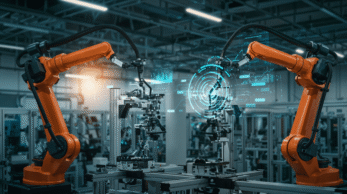What are the key factors to consider for safe maintenance?
Establishing a preventive maintenance plan is a fundamental step to ensure the smooth functioning of your maintenance operations while minimizing risks and costs. This structured approach helps anticipate breakdowns, improve asset reliability, and enhance safety across the organization.
Maintenance management processes
How to effectively manage the maintenance department?
For the smooth running of the maintenance mission, the Maintenance Manager, supported by an efficient information system, needs to:
Collect considerable data and analyze them regularly
Monitor and ensure consistency across all production and support processes
The maintenance management process includes defining objectives, means, and resources (financial, human, IT, and subcontracting) to be allocated. The end goal is to achieve the performance objectives set by management in compliance with laws, decrees, or regulatory standards.
Maintenance processes
There are four major processes at play behind maintenance, namely:
- Breakdown prevention and risk anticipation for preventive maintenance
To prevent asset failures and other undesirable events and anticipate risks, you must first define and rank according to your company’s priorities all events that may have an impact on the availability, safety, and security of your personnel, as well as the environment, the quality of products or services, assets’ value, and costs.
- Asset failure detection and break down for corrective maintenance
You must first and foremost have processes in place to detect asset failure. Corrective maintenance relies on upstream processes to detect and locate breakdowns and identify their root causes. In this regard, a CMMS solution will drastically facilitate the life of maintenance teams. It can now manage a large stock of parts while effectively running its preventive maintenance operation. The icing on the cake: implementing the solution has promoted the adoption of a corporate culture of prevention.
- Implementation processes
Whether within the framework of a preventive or corrective maintenance plan, the objective is always to carry out the maintenance work as decided or planned.
- Improvement processes for goods and/or services
This process aims to define, monitor, and implement improvements to assets in terms of reliability, maintainability, and/or safety while controlling costs.
Resources
As a Maintenance Manager, you are responsible for providing the supportive resources necessary for the smooth running of the maintenance process. In particular, you are required to:
- Develop the maintenance budget
- Deliver spare parts as requested
- Provide internal or external human resources
- Deliver operational documentation
- Provide the tools, support equipment, and information system
- Provide the necessary infrastructure
- Manage data and optimize results
How can a CMMS help make maintenance safe?
The CMMS is a simple tool designed to play a core role in the company from any sector of activity. It becomes a unique repository that centralizes all the maintenance data and helps you optimize your daily work, including improving your performance.
We know that choosing a CMMS can be complex.
Therefore, DimoMaint will help you to:
- make your assets more reliable
- ensure the safety of your stakeholders
- guarantee the quality of your products and services
- control risks more generally
Maintenance, safety and certifications
Certifications represent a competitive advantage and act as a unifying element within the company.
They are often essential in your field of activity as proof of your compliance with the regulatory standards in the eyes of all your company’s stakeholders, including customers and suppliers. They can only be obtained after a thorough audit proves that the quality assurance and safety procedures are well respected.
The CMMS allows you to centralize the requirements of the various certifying bodies. With rigorous use of our CMMS software DimoMaint, you will be able to provide all the supporting documentation needed to prove your compliance with regulatory standards in just a few clicks.
The ISO 9001 Quality Certification
The ISO 9001 standard focuses on the requirements tied to quality management systems. Any organization that intends to obtain the ISO 9001 standard must:
- demonstrate its ability to provide quality products and services that meet customer requirements and comply with applicable legal and regulatory requirements
- seek to continuously improve customer satisfaction
The ISO 14001 Environmental Certification
The ISO 14001 standard addresses the environmental impact of management. It is based on the principle of continuous improvement of environmental performance through monitoring the environmental impact of the organization’s activity.
The QSE system
The Quality Safety Environment (QSE) system considers both the ISO 9000 quality standards and the ISO 14000 environmental standards. This system also covers workplace health and safety.
The HAS Health Certification
The HAS Health Certification is issued to health establishments that respect strict rules defined by the Haute Autorité de Santé. There are 15 evaluation criteria divided into three categories: patients, care teams, and the establishment.
CMMS are critical to ensure the safety of maintenance personnel
Your position as maintenance manager within your organization is key. You must stay informed of all the events that occur in your organization to ensure that it runs smoothly and in optimal conditions.
This is where the CMMS comes in to facilitate your daily workload.
Overall, the CMMS improves your maintenance management, as it allows you to:
- CENTRALIZE all the maintenance data in a single repository, which can be quickly set up thanks to the joined efforts of your technicians;
- Easily ESTABLISH a preventive maintenance plan
- HARMONIZE lsafety best practices
- TRACE corrective maintenance works
- ACCESS a comprehensive maintenance log for any asset, with a fault tree indicating past maintenance works’ effects, causes, and repairs
- MONITOR performance indicators through the implementation of maintenance KPIs
- RECEIVE the feedback of your technicians or external contributors following the work on an asset
- MANAGE BETTER your maintenance teams





